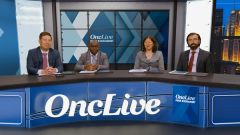
ADRIATIC Trial and Investigational Treatment Approaches for Limited-Stage SCLC
Faculty discuss potential treatment approaches for limited stage small-cell lung cancer currently under investigation in the ADRIATIC and other ongoing trials.
Episodes in this series

Transcript:
Taofeek K. Owonikoko, MD, PhD: [We are] talking about treatment options and making choices. I want to switch a little bit to the limited-stage setting. We now know that immunotherapy is well-established. We are waiting for data to be read out for the limited stage. Can you talk to us briefly about the ADRIATIC trial [NCT03703297] as well as some of the other immunotherapy approaches being explored in the limited stage setting? The rationale, what do you expect, and what do you anticipate will be the result of those trials?
Jacob Sands, MD: Essentially, the ADRIATIC study is not the only one doing this, but I’ll describe it in more detail. It’s a 3-arm study looking at chemoradiation vs chemoradiation plus durvalumab vs chemoradiation plus durvalumab plus tremelimumab. So it’s evaluating durva [durvalumab] vs standard of care plus placebo, it is evaluating durva/tremelimumab vs standard of care plus placebo, and it has a placebo control for treme [tremelimumab].I’ve now really convoluted that, but it’s essentially a 3-arm trial. I am excited about this. Not just durvalumab, [but also] atezolizumab, there’s another trial. But we’ve seen such benefit within the extensive-stage setting that I really expect to see benefit from those outcomes, and I await those enthusiastically. Now, durvalumab or atezo [atezolizumab], I expect to be beneficial. I’ll admit I’ve been a bit more skeptical in general about CTLA-4 inhibition. And I know that across institutes, people feel differently about this.I think with CTLA-4, everybody agrees on the toxicities, and we debate the efficacy. Now, we’ll wait and see. I would love for this trial to show extraordinary benefit. And if the inclusion of tremelimumab, a CTLA-4 inhibitor, really shows better efficacy, I would be so excited to use it. [However,] I’m skeptical. And I’m particularly excited about tremelimumab or atezolizumab or just the PD-1, PDL-1 inhibitors in this space, and CTLA-4. We’ll see.
Taofeek K. Owonikoko, MD, PhD: Are you in any way concerned about the experience in the extensive-stage setting where when we only did maintenance immunotherapy, we did not see the benefit of immunotherapy compared with concurrent followed by maintenance? This may not be as effective in this setting if you only gave it as consolidation therapy and not concurrent with chemoradiation.
Jacob Sands, MD: I think we’re using the wrong end points on these, quite frankly. Within the ADRIATIC study, they’re looking at median PFS [progression-free survival] and median OS [overall survival]. And that’s what they’ve looked at within each of these trials. Quite frankly, even in the metastatic setting, although those trials are positive, they’re razor-thin positive when looking at medians. But no one’s excited about the 2-, 2.5-month median OS. It’s good. I’m not putting it down. But what we’re excited about is the tail of the curve, where we see 10%, 12% absolute durable benefit in the metastatic setting. Now, in these limited-stage trials, if there’s a minimal change within the medians, if it’s statistically significant, then it gets approval. But it’s really the tail where I’d expect to see the clear benefit in this setting where we’re going for cure. And I’ll boldly state that, in the metastatic setting, I think we are actually seeing cure in some of these incurable patients. Now, give it another 10 years of data to see what happens. But I have [patients who] are more than 5 years out from their initial diagnosis of metastatic disease, so I fully expect to see an increase in that tail of the curve and an increase ultimately in [patients who] are cured. That’s not an end point, but ultimately cured within the limited-stage setting, which is why I’m so optimistic about it. As to those primary end points, which goes back to your question…. That may be an aberration, just based upon the statistical analysis, because the tails still look good in these trials and that’s where we see the real benefit from these drugs.
Transcript edited for clarity.





































